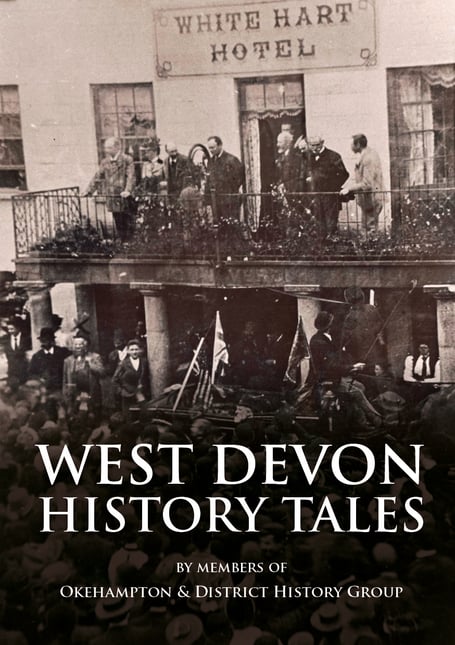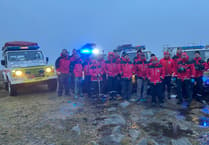THERE are plenty of colourful characters in Okehampton’s past, and no one knows this better than the Okehampton and District History Group, writes Sarah Pitt.
Now five members of the group have got togther to tell some of these stories, with the collection being edited by historian Dr Alan Parkinson, who lives in North Tawton.
He is joined by well-known Okehamton historian Mike Wreford, Sue Rowse and Mike Luxton from Exbourne, Chris Warpole from Belstone and Jolanta Wilson, an expert on the Polish army camp during the Second World War in the town.
They have between them got together to delve into the archives and tell some of these stories for a new book, West Devon History Tales.
The book is being launched at the snug in the White Hart Hotel on Thursday next week (December 8), which must have seen its own share of intrigue and secrets shared over the years.
A black and white photograph of the White Hart Hotel even features on the front of the book, showing streets thronged with people, apparently marking the British victory in the Second Boer War in 1899.
Some of the stories in the book are better known than others. Many may have heard some version of the story of sixteeth century aristocrat Lady Mary Howard, who has gone down in history for allegedly murdering three husbands. The legend has it that on dark nights, her coach can be heard travelling out of Tavistock towards Okehampton Castle, driven by a headless coachman, over and over again until daybreak, seeking atonement for her crimes.
Less well-known perhaps is the story of a cowboy called Billy Ezard, who set up the town’s first cinema in the early 20th century.
‘Lady Mary Howard, rather unfairly I think because of the attitudes of the time, has been accused of murdering three husbands and two children,’ said Alan. ‘The legend persisted in Okehampton.’
Billy Ezard opened the first Okehampton cinema, was a real-life cowboy who had left his north of England home to work as a cowboy in the US and Canada. Upon returning to this country, he went on tour, to tell tales of his exploirs.
‘He liked the look of Okehampton and thought he would open a cinema, so he went ahead and opened one in what is now Toast coffee shop. The interesting thing about Billy is he would dress up two or three times a week in cowboy costume, because he was a bareback rider, he was the real deal.’
By all accounts, Billy, originally from Bury in Lancashire, eventually got itchy feet and left Okehampon seeking adventures elsewhere. A photograph in the book shows him in his cowboy garb.
Another story in the book tells the tale of former Emperor of Ethiopia Haile Salaasse who when in exile at the start of the Second World War stayed several times at The White Hart.
‘He and his retinue and used to walk up and down the high street in their robes which must have turned a few heads in Okehampton!’ said Alan.
Mike Wreford has with his wife Hilary has writen many books on the history of Okehampton.
He said: ‘Alan contacted me and said what about doing a history of Okehampton making use of our archives. I said what about including other historians, so we have Chris Warpole from Belstone, Sue Rowse from Exbourne and a well-known chap called Mike Luxton – he was the police inspector in charge of the area for about 13 years.’
Also included on the team is Jolanta Wilson, who drew on the history of the Polish camp in the town to tell its stories. ‘We set about it and we have all done a number of stories,’ said Mike. ‘We thought it would make stories available that would otherwise be lost in the mists of time.’
Mike tells the story of ‘the Riding Down Incident’ which started with a wager between drinkers in the Red Lion Inn, which once stood where the Red Lion Yard is now, to race their horses in the street outside.
‘This was 1898, there was no electricity and just a few gas lamps. They raced through the town down North Street and they knocked down someone who had just left the church and he was killed,’ recalled Mike. ‘There was tremendous consternation throughout the town, a great deal of emotion, because of his widow and family.’
Another story is that of the Big Gun, mooted as a way of driving the Nazis out of Europe. Dartmoor was decided to be one of the only places this could be tested, but Mike explains that when the military exercise was carried out, the gun was in fact fired from Halwill, over the top of Okehampton, towards Dartmoor ‘which was risky to say the least’. ‘It never fired a shot after that,’ said Mike. ‘D-Day happened and there was no point in using it. It was huge, 25 men could sit on the barrel.’
Another story is of an early nineteenth century murder – what book of local history yarns would be complete without it? – near Thorndon Cross, when a lodger murdered the daughter of the house and her mother by slitting their throats. He was hanged 14 days later. Find out more in The White Hart Hotel in Okehampton at 11am on Thursday, October 8.





Comments
This article has no comments yet. Be the first to leave a comment.